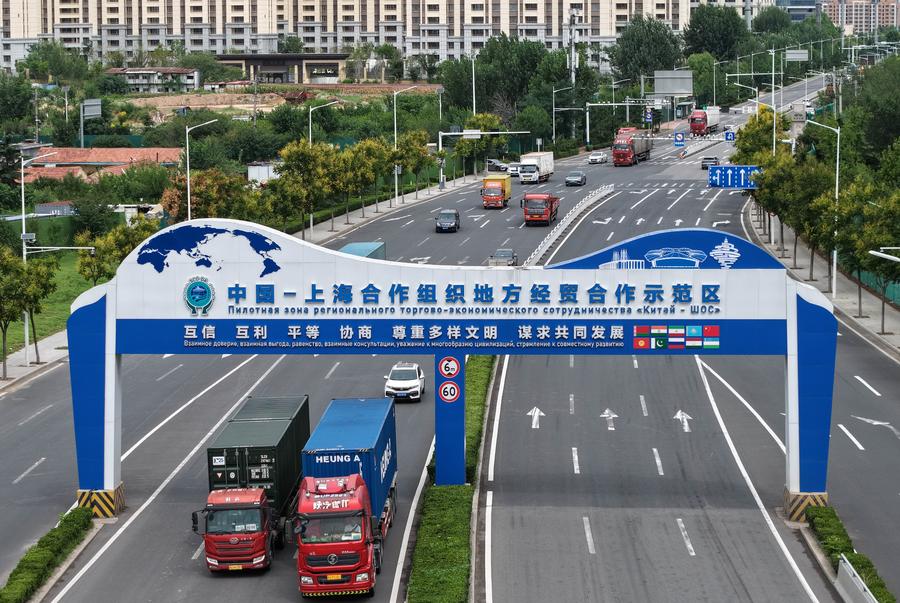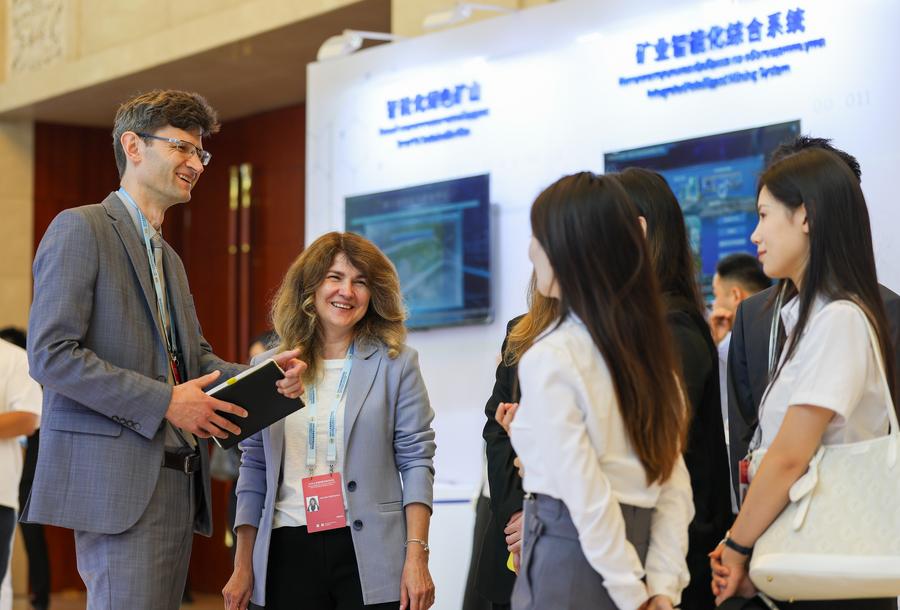On the shore of the Bohai Sea, world leaders will gather in China's northern port city Tianjin from Aug. 31 to Sept. 1 for the largest Shanghai Cooperation Organization (SCO) summit to date.
Under China's fifth rotating presidency, Chinese President Xi Jinping will chair the 25th Meeting of the Council of Heads of State of the SCO and the "SCO Plus" Meeting, and deliver keynote speeches.
Guided by the Shanghai Spirit -- a set of principles centered on mutual trust, mutual benefit, equality, consultation, respect for diversity of civilizations and pursuit of common development -- the SCO has crafted a model of regional cooperation attuned to both the trends of the times and the interests of its members, offering a paradigm for a new type of international relations.
Taking the Tianjin Summit as a new start, SCO leaders will review successful practices, pool consensus for cooperation and build up momentum toward a shared future.
CEMENT SCO TIES
Since assuming the rotating presidency following the SCO Astana Summit in 2024, China has hosted over 100 events in various fields, spanning politics, security, economy and trade, connectivity, technological innovation and green industry.
China continues to drive the SCO cooperation with bilateral and multilateral initiatives, not least by training programs on law enforcement and exchange activities aiming to enhance mutual understanding and cultural connections.
"2025 will be remembered as the year when China's active participation and strong contribution consolidated the organization's role as an important platform for multilateralism," said Farhat Ayesha, Pakistan's National Coordinator for the SCO.

China has always regarded the SCO as a high priority in its neighborhood diplomacy and added new dimensions to the Shanghai Spirit by putting forward timely and relevant proposals on development, security, cooperation, civilization and global governance. Meanwhile, it has also brought up the notion of building the SCO family and an SCO community with a shared future.
At the upcoming summit, Xi is expected to elaborate on China's new vision and propositions for the SCO in carrying forward the Shanghai Spirit, embracing the mission of the times, and responding to the people's expectations.
According to Yasiru Ranaraja, a Sri Lankan international affairs expert and founding director of the Belt and Road Initiative Sri Lanka, the SCO has continued to grow and expand over the past 24 years, reflecting inclusiveness as well as its appeal and vitality.
As many countries want to join the SCO as dialogue partners and members, it has demonstrated the international community's recognition of this organization, he said.
FRUITFUL COOPERATION
The SCO has steadily expanded and deepened cooperation across all sectors since its founding in 2001, driving intra-regional trade to successive record highs with enhanced regional connectivity, continuously solidified security and a closer bond between peoples.
From January to July, China's imports and exports with other SCO members totaled 2.11 trillion yuan (295.58 billion U.S. dollars), up by 3 percent year on year, according to the latest data from China's General Administration of Customs.
Multiple transportation corridors have opened shipping channels and trade routes for the SCO countries, serving as new engines for their industrial and economic development.
Interconnection projects such as the China-Kyrgyzstan-Uzbekistan railway are under construction. In June, the first-phase pilot area of the largest container hub in the Caspian Sea started operating in the port of Aktau in western Kazakhstan.
In recent years, new areas of win-win cooperation, such as green, sustainable and low-emission development, have taken center stage within the SCO. China's water-saving irrigation technologies are widely used in Uzbekistan, Pakistan and other SCO countries, while new energy vehicles are cruising the streets of Belarus, Tajikistan and Kazakhstan.
Renewable energy projects between China and other SCO countries total approximately 96.3 gigawatts of installed capacity, with 80 percent being solar and wind, according to a report released in June by the China Renewable Energy Engineering Institute.

Behind the growing trade ties lies a more secure and stable regional environment. The SCO countries have continued efforts to combat the "three evil forces" of terrorism, extremism and separatism, with a special focus on threats such as cross-border drug smuggling and transnational organized crime.
Speeding up the establishment of four security centers, notably a universal center and its branches to address the challenges and threats to the security of SCO member states and an Anti-Drug Center, the organization honors its commitment to strengthening regional security and stability by shaping a new landscape of regional security cooperation.
According to Sri Lankan expert Ranaraja, the SCO helps member states combat terrorism and boost economic growth, "which is crucial to strengthening regional security."
Over the past year, cultural exchange events like the SCO Forum on Women, the 2025 SCO Film Festival, the Inter-Civilizational Dialogue among SCO Countries 2025, the SCO Media and Think Tank Summit and others have helped forge a closer bond between the peoples of the SCO countries.
The SCO "stands as a shining example of regional unity and shared purpose in an increasingly interconnected world," enabling countries to strengthen economic ties, cultural bonds and security cooperation, said Purnima Anand, chairperson of the BRICS International Forum.
EXTEND GLOBAL REACH
Amid shifting global landscapes, the SCO has been contributing to improving global governance through promoting a new type of international relations grounded in mutual respect, fairness and win-win cooperation.
Guided by the principle of extensive consultation, joint contribution and shared benefits, the organization has steadily broadened its network of partners. Belarus was formally accepted as the 10th member state of the inter-governmental organization at the Astana Summit, bolstering the SCO's capacity for regional cooperation.
The Astana summit also brought global leaders together for the first "SCO Plus" Meeting, a brand-new format that further broadens the group's inclusiveness and representation on global issues, raising expectations for its role in shaping global governance.
The SCO Plus is "timely and necessary," Uzbek President Shavkat Mirziyoyev said at the SCO Plus Meeting. "The outcomes of this meeting will give a strong impetus to the development of a multifaceted partnership within the SCO."

Echoing his view, Tajik President Emomali Rahmon expressed confidence that the SCO Plus will become a useful platform for bringing multilateral cooperation within the SCO family to a new level of development in accordance with the call of the times.
Spain's bimonthly foreign affairs magazine Politica Exterior said in a recent article that the SCO has expanded its focus from border security among China and Central Asian countries to global issues such as the reconstruction of Afghanistan.
Such expansion has given the organization "political weight," demonstrating that Global South nations could "achieve political prominence without Western involvement," it said.
Adhere Cavince, a Kenyan scholar on international relations, told Xinhua that platforms like the SCO have not only promoted a multipolar world, but also empowered the Global South with a greater voice in global governance and a bigger role in shaping the rules on major international issues.
Looking forward, Akkan Suver, president of the Marmara Group Foundation in Türkiye, expressed high expectations for the upcoming Tianjin summit.
He noted that through multilateral platforms like the SCO, China-proposed initiatives, such as the BRI, strengthen exchanges and trust among countries and peoples and help address global challenges.
















